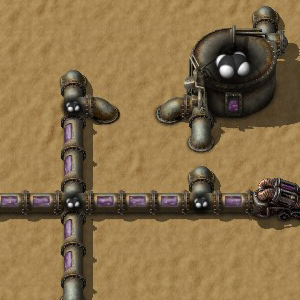Petroleum gas: Difference between revisions
Jump to navigation
Jump to search
m (gas -> fluid) |
Neutrality (talk | contribs) No edit summary |
||
| Line 20: | Line 20: | ||
{{history|0.9.0| | {{history|0.9.0| | ||
* Introduced}} | * Introduced}} | ||
== Trivia == | |||
The icon used for petroleum gas is the chemical [https://en.wikipedia.org/wiki/Ethylene Ethylene] | |||
== See also == | == See also == | ||
Revision as of 21:59, 21 November 2022
| Petroleum gas |
|
Prototype type |
|
|
Internal name |
petroleum-gas |
|
Required technologies |
|
|
Produced by |
|
|
Consumed by |
|
Petroleum gas is a fluid converted from crude oil (in an oil refinery) or light oil (in a chemical plant). Petroleum gas is used to create plastic bars and sulfur, important ingredients for mid-to-high-level recipes.
Petroleum gas can also be used to create solid fuel, but the ratio of fuel created is not as efficient as that of light oil, and petroleum gas is usually too valuable to waste.
| Building | Process | Results |
|---|---|---|
| Oil refinery | Basic oil processing | + → |
| Oil refinery | Advanced oil processing | + + → + ( + ) |
| Chemical plant | Light oil cracking | + + → |
| Oil refinery | Coal liquefaction | + + + → + ( + ) |
History
- 0.9.0:
- Introduced
Trivia
The icon used for petroleum gas is the chemical Ethylene
